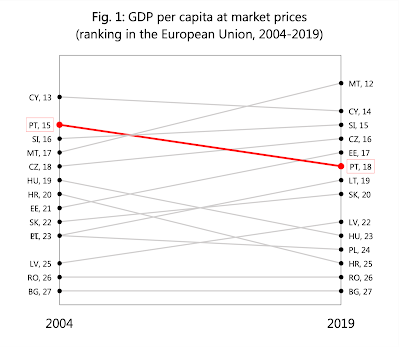Salaries in Portugal: have workers lost their purchasing power?
Premise: A worker, who has earned minimum wage for the past 15 years, argued on TV he lost purchasing power during the past government.
Was the interviewee correct or not? This is a common complaint among Portuguese and one that anyone will easily hear in a political debate (or at a café, for that matter). Thus, it seemed just right to be the topic of the first post in this blog.
First, we need to have a definition of purchasing power. For now, and to keep it simple, I'll use CPI as the deflator to construct the purchasing power. Plotting the minimum salary and the average base salary (before food and transportation subsidies, and bonuses) since 2000, we get a chart similar to this:
where the dashed lines are the nominal values and the thick lines are in purchasing power parity (i.e., deflated by inflation). Values are calculated as monthly wage times 14 months, divided by 12, thus accounting for Christmas and summer bonuses.
Two striking conclusions from this chart:
- How flat wages were (minimum and average) during the 2000s.
- The rise in wages since Costa took office.
Again, two things become quite clear:
- The minimum salary barely increased (in PPP terms) until 2007, with the average salary growing faster.
- Since 2007, the minimum salary has grown faster (except for 2019 and 2021) than the average salary, contributing to the evident wage compression in Portugal.
The Costa (II) government (2019 - 2022) is when the average salary is expected to rise the most: 14% in 3 years. The same happens with the minimum wage. This is particularly impressive compared to Guterres (I) and Sócrates (I): both lasted 4 years and witnessed smaller increases.
This becomes even more evident if we annualize wage growths (i.e., average growth per year, discounting inflation):
Notably, António Costa was prime minister when salaries rose the most, by far. Minimum wages rose twice as fast compared to the second-fastest period, Sócrates (I and II), and the average base salary rose 67% faster than during Guterres' two terms (2.9% vs. 1.7%).





Comments
Post a Comment